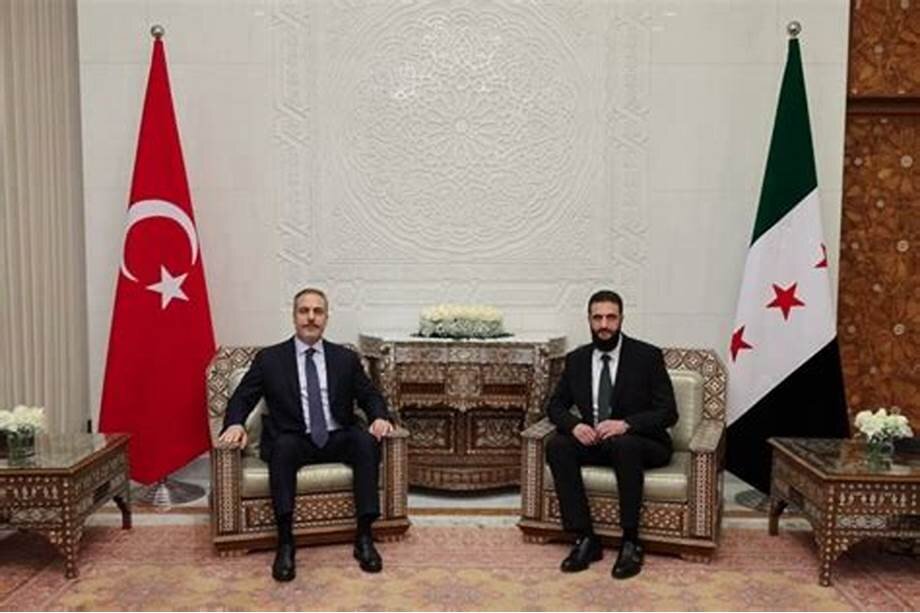From fatigues to fashion AlSharaas suit and tie cannot hide rebels true nature
From fatigues to fashion: Al-Sharaa's suit and tie cannot hide rebels’ true nature
TEHRAN - Syria’s de facto leader Ahmed al-Sharaa has been dancing to the tune of his foreign backers, notably Turkey and the United States, since his armed men ousted the Syrian government earlier this month.

Hayat Tahrir al-Sham (HTS) rebel group led by al-Sharaa, previously known as Abu Mohammed al-Jolani, along with its allies took over Damascus on December 8 and announced the toppling of president Bashar Assad.
On Sunday, the HTS leader held his first public news conference since Assad’s fall with visiting Turkish Foreign Minister Hakan Fidan.
The top Turkish diplomat vowed to continue to support Syria’s new rulers and called for lifting international sanctions on the Arab nation.
Al-Sharaa echoed his guest’s remarks.
“All the economic sanctions must be lifted, now the predator has gone and only the victims remain. The factors of injustice and oppression have gone. Now the time is opportune for these sanctions to be lifted.”
Al-Sharaa is a former member of Al-Qaeda and ISIL for whom the US had offered a bounty of $10 million.
But on Friday, Assistant Secretary of State Barbara Leaf, who is the top State Department official for the Middle East (West Asia) announced that Washington is dropping the reward for the arrest of the HTS leader.
Leaf made the comments as she led an American delegation that traveled to Syria to hold talks with Syrian new rulers.
Describing Assad as “the predator” and citing “injustice and oppression” under his rule throws a spotlight on the crimes that al-Sharaa and other terrorists committed in Syria after the 2011 Arab Spring.
Over the past years, Ankara had backed rebels seeking to oust Assad against the backdrop of protests that began in Syria in the wake of the Arab Spring.
Fidan’s visit to Damascus comes amid ongoing fighting in northeast Syria between the Turkish-backed Syrian fighters and the Kurdish People’s Protection Units (YPG) which Ankara regards as a terrorist organization.
The HTS leader also hosted Lebanese Druze leader Walid Jumblatt on Sunday vowing to send a government delegation to the southwestern Druze city of Sweida to provide services to its community.
In addition to his statements with Fidan and Jumblatt, al-Sharaa’s choice to wear a suit and tie rather than the military fatigues he favored in his days as a terrorist commander, has grabbed the media attention.
Al-Sharaa’s new style may please his foreign backers, but will raise eyebrows among his allied rebel groups in Syria that are vying for power.
Over the past days, protests have erupted against HTS as it is cracking down on voices of dissent. Protesters in Aleppo, Idlib and some other towns and villages have denounced arrests made by the rebel group.
Public anger in Syria is also expected to grow in the face of the inaction of HTS toward Israel’s aggression against the country.
The current situation suggests that the reliance of Syria's new leadership on external allies, coupled with the repression of internal dissent, may escalate into a significant crisis.
This may serve as a crucial wake-up call for Turkey. The increasing dissent and the weakening influence of the HTS could pose significant challenges for Ankara, which is believed to be the main supporter of the rebel group.
Besides, the YPG that is spearheading the US-allied Syrian Democratic Forces (SDF) in Syria could be a pain in the neck for Turkey. The US supports the group in line with its geopolitical interests. The potential conflict of interests between Washington and Ankara could work to Turkey’s detriment.
In fact, Turkey is now experiencing its honeymoon in Syria which could come to an end soon.
Terrorism is intrinsically linked to the armed factions that have taken control of Syria. These fundamental characteristics are unlikely to change. In such an atmosphere, ISIL and Al-Qaeda terrorists may raise their ugly head in Syria and pose a grave threat to regional and international peace and security.
source: tehrantimes.com